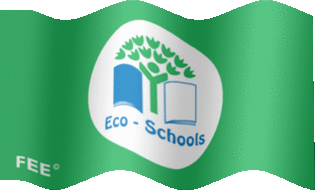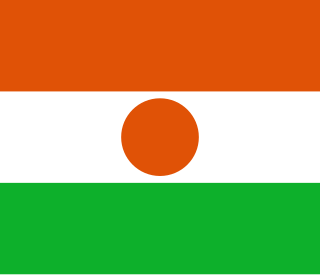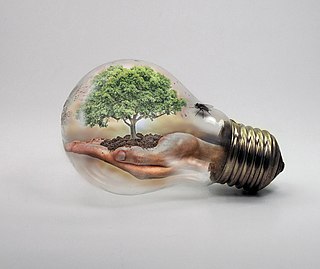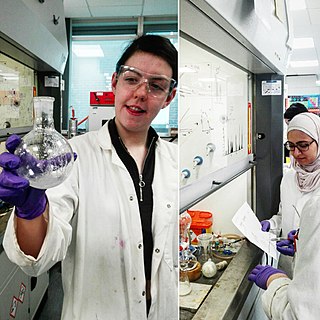
The United Nations Environment Programme (UNEP) is responsible for coordinating responses to environmental issues within the United Nations system. It was established by Maurice Strong, its first director, after the United Nations Conference on the Human Environment in Stockholm in June 1972. Its mandate is to provide leadership, deliver science and develop solutions on a wide range of issues, including climate change, the management of marine and terrestrial ecosystems, and green economic development. The organization also develops international environmental agreements; publishes and promotes environmental science and helps national governments achieve environmental targets.
The history of education in Africa can be roughly divided into pre- and post- colonial periods. Since the introduction of formal education to Africa by European colonists, African education, particularly in West and Central Africa, is characterised by both traditional African teachings and European-style schooling systems. The state of education reflects not only the effects of colonialism, but instability resulting from and exacerbated by armed conflicts in many regions of Africa as well as fallout from humanitarian crises such as famine, lack of drinking water, and outbreaks of diseases such as malaria and Ebola, among others. Although the quality of education and the quantity of well-equipped schools and teachers has steadily increased since the onset of the colonial period, there are still evident numerous inequalities in the existing educational systems based on region, economic status, and gender.

Environmental education (EE) refers to organized efforts to teach how natural environments function, and particularly, how human beings can manage behavior and ecosystems to live sustainably. It is a multi-disciplinary field integrating disciplines such as biology, chemistry, physics, ecology, earth science, atmospheric science, mathematics, and geography.
The United Nations General Assembly, in December 2003, proclaimed the years 2005-2015 as the International Decade for Action 'Water for Life'. Its primary goal is to promote efforts to fulfill international commitments made on water and water related issues. In the United Nations Millennium Development Goals (MDGs) by 2015. In March 2019, the United Nations General Assembly declared the years 2018-2028 as the Water Action Decade.
Human rights education (HRE) is the learning process that seeks to build up knowledge, values, and proficiency in the rights that each person is entitled to. This education teaches students to examine their own experiences from a point of view that enables them to integrate these concepts into their values, decision-making, and daily situations. According to Amnesty International, HRE is a way to empower people, training them so their skills and behaviors will promote dignity and equality within their communities, societies, and throughout the world.

Eco-Schools is an international programme of the Foundation for Environmental Education (FEE) that aims to “empower students to be the change our sustainable world needs by engaging them in fun, action-orientated, and socially responsible learning.”

The Decade of Education for Sustainable Development (DESD) 2005–2014 was an Education for Sustainable Development (ESD) initiative of the United Nations. The Decade was delivered by UNESCO as lead agency, and gave rise to Regional Centres of Expertise (RCE) networks, and the GUPES universities' partnership. The launch of the United Nations Decade of Education for Sustainable Development started a global movement to reorient education to address the challenges of sustainable development. It was the first UN Decade to establish a global monitoring and evaluation process and expert group. Building on the achievement of the Decade, stated in the Aichi-Nagoya Declaration on ESD, UNESCO endorsed the Global Action Programme on ESD (GAP) in the 37th session of its General Conference. Acknowledged by UN general assembly Resolution A/RES/69/211 and launched at the UNESCO World Conference on ESD in 2014, the GAP aims to scale-up actions and good practices. UNESCO has a major role, along with its partners, in bringing about key achievements to ensure the principles of ESD are promoted through formal, non-formal and informal education.
International Literacy Day is an international observance, celebrated each year on 8 September, that was declared by UNESCO on 26 October 1966 at the 14th session of UNESCO's General Conference. It was celebrated for the first time in 1967. Its aim is to highlight the importance of literacy to individuals, communities and societies. Celebrations take place in several countries.
The United Nations Decade for Women was a period from 1975 to 1985 focused on the policies and issues that impact women, such as pay equity, gendered violence, land holding, and other human rights. It was adopted December 15, 1975, by the United Nations General Assembly by Resolution 31/136.
Human development involves studies of the human condition with its core being the capability approach. The inequality adjusted Human Development Index is used as a way of measuring actual progress in human development by the United Nations. It is an alternative approach to a single focus on economic growth, and focused more on social justice, as a way of understanding progress

Education in Niger, as in other nations in the Sahelian region of Africa, faces challenges due to poverty and poor access to schools. Although education is compulsory between the ages of seven and fifteen, with primary and secondary school leading into optional higher education, Niger has one of the lowest literacy rates in the world. With assistance from external organizations, Niger has been pursuing educational improvement, reforming how schools utilize languages of instruction, and exploring how the system can close gender gaps in retention and learning.
Environmental adult education is recognized as a "hybrid outgrowth of the environmental movement and adult education, combining an ecological orientation with a learning paradigm to provide a vigorous educational approach to environmental concerns."

Action for Climate Empowerment (ACE) is a term adopted by the United Nations Framework Convention on Climate Change (UNFCCC). It refers to Article 6 of the Convention's original text (1992), focusing on six priority areas: education, training, public awareness, public participation, public access to information, and international cooperation on these issues. The implementation of all six areas has been identified as the pivotal factor for everyone to understand and participate in solving the complex challenges presented by climate change. The importance of ACE is reflected in other international frameworks such as the Sustainable Development Goals ; the Global Action Programme for Education for Sustainable Development ; the Aarhus Convention (2011); the Escazú Agreement (2018) and the Bali Guidelines (2010).

Climate change education (CCE) is education that aims to address and develop effective responses to climate change. It helps learners understand the causes and consequences of climate change, prepares them to live with the impacts of climate change and empowers learners to take appropriate actions to adopt more sustainable lifestyles. Climate change and climate change education are global challenges that can be anchored in the curriculum in order to provide local learning and widen up mindset shits on how climate change can be mitigated. In such as case CCE is more than climate change literacy but understanding ways of dealing with climate
Global Reports on Adult Learning and Education (GRALE) are a series of reports that monitor progress on Adult Learning and Education (ALE), promote action, identify trends in the field of ALE, and explore solutions to challenges.
The Declaration and Programme of Action on a Culture of Peace was adopted by the United Nations General Assembly on September 13, 1999. This occurred after ten months of negotiations in the context of preparations for the International Year for the Culture of Peace.

The International Year of Indigenous Languages was a United Nations observance in 2019 that aimed to raise awareness of the consequences of the endangerment of Indigenous languages across the world, with an aim to establish a link between language, development, peace, and reconciliation.

The International Day of Women and Girls in Science is an annual observance adopted by the United Nations General Assembly to promote the full and equal access and participation of women in Science, Technology, Engineering and Mathematics (STEM) fields. The United Nations General Assembly passed resolution 70/212 on 22 December 2015, which proclaimed the 11th day of February as the annual commemoration of the observance. A theme is selected annually to highlight a particular focus and area of discussion around a focus point for gender equality in science.

Sustainable Development Goal 4 is about quality education and is among the 17 Sustainable Development Goals established by the United Nations in September 2015. The full title of SDG 4 is "Ensure inclusive and equitable quality education and promote lifelong learning opportunities for all".

Ilapavuluri Venkata Subba Rao or Dr. I. V. Subba Rao is a retired Indian Administrative Service (IAS) officer of Andhra Pradesh cadre and 1979 batch who has served at various positions in the Government of India and the Government of Andhra Pradesh. He worked as the Secretary to the Vice-President of India from August 2017 to August 2022.










